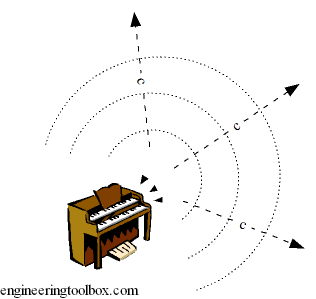Speed of Sound - Equations (original) (raw)
A disturbance introduced in some point of a substance - solid or fluid - will propagate through the substance as a wave with a finite velocity.

Acoustic Velocity and Speed of Sound
The velocity at which a small disturbance will propagate through the medium is called Acoustic Velocity or Speed of Sound.
Note that speed is a scalar quantity. Velocity is vector quantity with direction.
The acoustic velocity is related to the change in pressure and density of the substance and can be expressed as
c = (dp / dρ)1/2 (1)
where
c = speed of sound (m/s, ft/s)
dp = change in pressure (Pa, psi)
dρ = change in density (kg/m3, lb/ft3)
Speed of Sound in Gases, Fluids and Solids
The acoustic velocity can alternatively be expressed with Hook's Law as
c = (K / ρ)1/2 (2)
where
K = Bulk Modulus of Elasticity (Pa, psi)
ρ = density (kg/m3, lb/ft3)
This equation is valid for liquids, solids and gases. The sound travels faster through media with higher elasticity and/or lower density. If a medium is not compressible at all - incompressible - the speed of sound is infinite (c ≈ ∞).
Bulk of Modulus and Density some common Substances
| Substance | Bulk Modulus Elasticity - K - (109 N/m2) | Density - ρ - (kg/m3) |
|---|---|---|
| Water (10 oC) | 2.09 | 999.7 |
| Oil | 1.35 | 920 |
| Ethyl Alcohol | 1.06 | 810 |
| Mercury | 28.5 | 13595 |
- properties at 1 bar and 0 oC
Speed of Sound - Sonic Velocity - in Ideal Gases
Since the acoustic disturbance introduced in a point is very small the heat transfer can be neglected and for gases assumed isentropic. For an isentropic process the ideal gas law can be used and the speed of sound can be expressed as
c = (k p / ρ)1/2
= (k R T)1/2 (3)
where
k = ratio of specific heats (adiabatic index)
p = pressure (Pa, psi)
R = individual gas constant(J/kg K, ft lb/slug oR)
T = absolute temperature (oK, oR)
For an ideal gas the speed of sound is proportional to the square root of the absolute temperature.
Example - Speed of Sound in Air
The speed of sound in air at 0 oC (273.15 K) and absolute pressure 1 bar can be calculated as
c = (1.4 (286.9 J/K kg) (273.15 K))1/2
= 331.2 (m/s)
where
k = 1.4
and
R = 286.9 (J/K kg)
The speed of sound in air at 20 oC(293.15 K) and absolute pressure 1 bar can be calculated as
c = (1.4 (286.9 J/K kg) (293.15 K))1/2
= 343.1 (m/s)
Example - Speed of Sound in Water
The speed of sound in water at 10 oC can be calculated as
c = ((2.09×109N/m2) / (999.7 kg/m3))1/2
= 1446 (m/s)
where
E v = 2.09×109 (N/m2)
and
ρ = 999.7 (kg/m3)
- Speed of Sound in Water - Speed of sound in water at different temperatures - imperial and SI units.
Speed of Sound in Solids
- Speed of Sound in common Solids
- Elastic Properties and Young Modulus for some Materials
- The Bulk Modulus for Elasticity
- Material Properties
Subsonic and Supersonic speed
- If the Mach Number is below 1, the flow velocity is lower than the speed of sound - and the speed is subsonic.
- If the Mach Number is 1 - the speed is transonic.
- If the Mach Number is above 1, the flow velocity is higher than the speed of sound - and the speed is supersonic.
Related Documents
Acetone - Thermophysical Properties
Chemical, physical and thermal properties of acetone, also called 2-propanone, dimethyl ketone and pyroacetic acid. Phase diagram included.
Hooke's Law
Hooke's law - force, elongation and spring constant.
International Standard Atmosphere
International standard atmosphere in elevation -2000 to 30000 metre - pressure, temperature, density, viscosity, thermal conductivity and velocity of sound.
Isentropic Flow
Fluid flow with constant entropy is also called isentropic flow.

